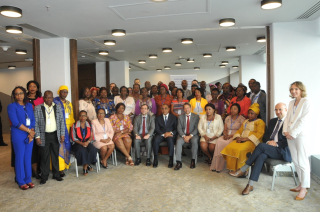
Posted by Gwénaëlle Suc and Fabien Gonguet[1]
How to use the budget and PFM processes and tools to contribute to gender equality outcomes in Francophone African countries? This was the topic of the seminar organized by FAD in Abidjan in February 2020, in partnership with the European Union and with the cooperation of UN Women. For three days, 40 participants from 10 francophone African countries[2] shared their experiences and worked together to design and operationalize gender budgeting strategies. Delegations from West, Central and Southern African regions included representatives from ministries of finance and ministries of gender, supreme audit institutions and parliaments. A key message of the seminar was that the successful implementation of gender budgeting requires a strong coordination between all stakeholders involved in the preparation, the execution and the control of the budget, ideally under the leadership of the ministry in charge of the budget.
A survey conducted prior to the seminar highlighted that all participating countries have adopted international commitments and national strategies to promote gender equality. However, implementation of these policies has generally been weak. The development of gender budgeting, as a tool to contribute to gender equality, is limited to a few initiatives in some of the participating countries. For example, Burkina Faso has been engaged in the implementation of gender budgeting since 2014 and gender issues were mainstreamed for the first time in the 2018 budget circular. 18 ministries are now involved in the implementation of gender budgeting, and the government incorporates gender responsive programs and actions, along with specific indicators, in their budget proposals. In Senegal, a gender budget statement has been attached to the budget law since 2016[3].
Participants were impressed by the experience of Morocco, a frontrunner in the development of gender budgeting among Francophone countries. While the first feasibility studies were initiated in 2001, gender budgeting was operationalized in 2013 with the creation of an excellence center for gender budgeting within the Moroccan Ministry of Finance. An annual report is published[4] detailing gender performance for each departmental program.
Most Francophone African countries are currently engaged in the implementation of program budgeting and gender budgeting is gaining momentum as part of this reform. While program budgeting is not a prerequisite for gender budgeting, it facilitates its implementation by linking budget targets with political objectives, including gender equality. The crucial role of gender units in each ministry, as a counterpart to the ministry of finance, was also emphasized to ensure efficient coordination and the spread of gender awareness.
Participants agreed that a difficult challenge they face is the lack of gender disaggregated data to assess the impact of programs on gender equality. Capacity building needs are also high. In additional to these technical challenges, both the Minister of Economy and the Minister of Budget of Côte d’Ivoire, who respectively opened and closed the seminar, reminded participants that strong political support is essential to make significant progress in the reduction of gender inequalities.
More information on the seminar is available on social media:
IMFCapDev Facebook & Twitter
https://twitter.com/imfcapdev/status/1224355266600275969;
https://twitter.com/imfcapdev/status/1224761518929129473;
https://twitter.com/imfcapdev/status/1225183618559107072;
https://twitter.com/imfcapdev/status/1225425608450215939;
https://www.facebook.com/IMFCapacityDevelopment/posts/2463683687186405
FMIActualites Twitter
https://twitter.com/FMIactualites/status/1224451900478590976;
https://twitter.com/FMIactualites/status/1225501952710184960;
IMFAfrica Facebook
https://www.facebook.com/IMFAfrica/posts/2745545265524427;
https://www.facebook.com/IMFAfrica/videos/622662255221764/
[1] Economists in the Fiscal Affairs Department of the IMF.
[2] Benin, Burkina Faso, Cameroon, Côte d’Ivoire, Madagascar, Morocco, Niger, Republic of Congo, Senegal, Togo.
[3] http://www.budget.gouv.sn/documents/public_download/5bca0e46-2634-4cc2-8902-721e0a610b4d/telechargement
[4] https://cebsg.finances.gov.ma/uploads/fichiers/genre_fr_2020_26-11-2019_11-14.pdf
Note: The posts on the IMF PFM Blog should not be reported as representing the views of the IMF. The views expressed are those of the authors and do not necessarily represent those of the IMF or IMF policy.





